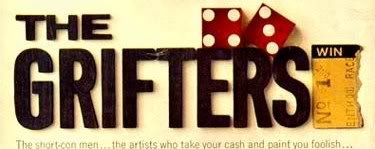Avoiding Cons

 The Daily Grifter
, Posted in
Con Artists
,
con men
,
Ebay
,
Ebay Scams
,
Online Sales Scams
,
0 Comments
The Daily Grifter
, Posted in
Con Artists
,
con men
,
Ebay
,
Ebay Scams
,
Online Sales Scams
,
0 Comments
Online Sales Scams
Another Internet con preys on people who sell items online. Someone will respond to a classified ad offering to buy the item or win an item in an eBay auction, but they require the use of a special shipping company or claim that a banking regulation requires them to pay with a large cashier's check. The check will be in an amount that far exceeds the item's cost (a $5,000 check for a $100 item, for example). The con artist instructs the seller to cash the check, keep the amount owed for the item, then send the rest of the cash back to him. This supposedly satisfies the regulation or shipping company. If the seller doesn't bother waiting for the check to clear -- and many don't -- the con artist will get nearly $5,000 in cash in return for a check that eventually bounces, leaving the victim on the hook for the full amount.
Home Improvement Cons
Often, a con artist working a home improvement con will approach a homeowner with a story similar to this one:
We were doing some work down the street, and I noticed it looks like you could use a new roof. We have some supplies left over from the other job, and we'll have to return them to the supplier either way, so I can use the leftovers to give you a new roof for a really low price.
Once the phony roofer has the money in hand, he'll disappear. No new roof. Some con artists are actual contractors, but they run scams as part of their business. They might get halfway through the roofing job, then demand more money. When a person has half a roof on his house, he's not in much of a position to argue. The roofer might actually complete the work, but do a poor job or use sub-standard materials. Worse still, he might have a clause in the contract that allows him to put a lien on the house and foreclose if the owner misses a payment. If you refuse to pay for the shoddy work, you could end up losing the whole house.
Home improvement scams sometimes involve kickbacks to other con artists. A contractor approaches a homeowner with an offer to do work, and then directs the owner to a specific person who will help finance the money required for the job. This "friend" might give the owner a terrible rate on the loan, sending some of it back to the contractor. In other scams, a "home inspector" shows up, claiming to represent the city or county code enforcement office. She might even have an ID that appears valid. This inspector will invariably find several major problems that violate the code and could result in hefty fines. As an option, she directs the owner to a friend who can do the work for a good price. It usually isn't a good price, and it's never good work. Cheap materials, shoddy workmanship and unnecessary replacements are the hallmarks of these "home improvement specialists. "
Avoiding the Con in Construction-How to plan for hassle-free home building, renovation & repair
The Art of the Con: Avoiding Offender Manipulation --2001 publication.
Avoiding Relapse: Catching Your Inner Con
Ripped Off on Ebay: A Step-by-Step Guide to Recovering from an Ebay Scam
The eBay Survival Guide: How To Make Money and Avoid Losing Your Shirt



















0 Response to "Avoiding Cons"
Post a Comment